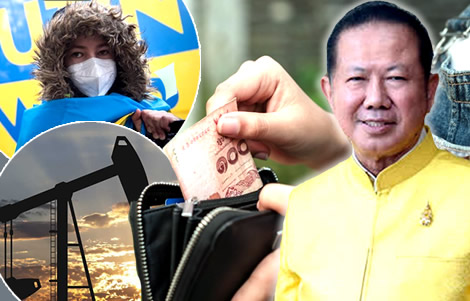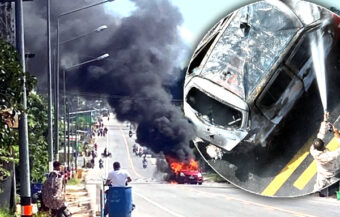Thai exporters say that shipments will be off by between $4 billion and $5 billion by the end of June. At the same time, the insecurity caused by the war will impact world travel and tourism as well as consumer confidence at home. This week, Mr Sanan Angubolkul, the Chairman of the Thai Chamber of Commerce said he expects this war to last for some time bringing with it rising energy costs and disruption to world trade caused by economic sanctions. This is worrying for the kingdom which reached the edges of its economic limits last year before the reopening of the country to foreign tourism on November 1st last.
The Prime Minister chaired an advisory council meeting on Wednesday at which the rising headwinds to the country’s economic recovery were discussed. Chief among them was concern over the war in Ukraine which threatens to impede worldwide economic activity as world energy prices soar to unsustainable levels. At the same time, the Bank of Thailand has said it is reviewing its projections for inflation in Thailand but for now, insists that they will be still in the 1% to 3% range for this year. Prime Minister Prayuth Chan ocha has ordered plans drawn up to ease the hardship on Thailand’s most vulnerable families, particularly with regard to electricity costs and directed his economic team’s efforts towards fighting the crippling problem of household debt in the country.

On Wednesday, Prime Minister Prayut Chan ocha chaired a meeting of his advisory council at the Thai Khu Fah Building in Government House where items on the agenda were the economic impact of the war in Ukraine and damage to consumer confidence in the kingdom being caused by persistently high levels of COVID-19 infection from the Omicron virus strain.
General Prayut was notably concerned about the impact of rising energy costs on the Thai economy and its knock-on effects for the less well off.
The government leader asked officials to draw up plans to help alleviate the rising levels of expenses for the most vulnerable families in Thailand. He tasked them with looking at the cost of electricity bills and the price of petrol at the pumps, particularly for those using cars or motorbikes.
Ukraine war has opened up a Pandora’s Box of negative economic effects caused by sanctions on Russia which will impact the world’s economy
Oil prices have spiked because of the war in Ukraine with fears that western countries may be prompted to impose even further sanctions on Russia which so far have not directly impeded the flow of oil.
In April 2020, oil fell to as low as $18.38 a barrel for Brent Crude. In recent days, it has hit $113.00 and is predicted to spike further to over $120 a barrel. The price of oil impacts the full range of commercial activity across all economies.
The effects of the war are particularly acute in Europe where 40% of natural gas supplied on the continent comes from Russia whose energy supplies account for 20% of the continent’s electricity output.
The United Kingdom has just imposed a ban on Russian shipping as western powers show an unprecedented level of zeal and determination to wage economic war on Russia over its actions in Ukraine.
China views the sanctions as ‘illegal’
Other countries are expected to follow suit as Europe and the United States, supported by strong public opinion, see the threat from Russia to the rest of Europe as one of overriding concern.
China has already expressed its unease about the unprecedented strength and scope of the sanctions against Russia with top Chinese regulator Guo Shuqing, Chairman of the China Banking and Insurance Regulatory Commission, saying on Wednesday that the communist country would not be pursuing such a course which authorities there view as ‘illegal’
Reduced GDP worldwide hurts demand for Thailand’s exports while rising costs at home hit spending
In a wider context, leaders in business and industry are arguing that the war in Ukraine and the economic fallout are likely to hinder Thailand’s recovery prospects this year through a combination of reduced world trade and economic activity caused by an extraordinary rise in energy prices.
Thailand is already experiencing its own internal problems with a rising level of COVID-19 causing the public to be wary.
These new external fears have been expressed by Mr Sanan Angubolkul, the Chairman of the Thai Chamber of Commerce.
‘The Thai chamber forecasts the Russia-Ukraine crisis will last a long time,’ Mr Sanan predicted. ‘In the short term, the direct impact is unlikely to be significant, but the indirect effect on Thailand is a key area of concern as the crisis will affect global oil prices. We expect global oil prices will exceed US$120 per barrel, resulting in an increase of about 5-7.5 baht per litre in domestic oil prices.’
Household debt was examined by top officials on Wednesday and is seen as an underlying problem
The meeting at Government House on Wednesday focused on the chronic problem in Thailand of household debt which is still at record high levels although the rate of growth in household borrowing is believed to have eased off in the last quarter of 2021.
Nevertheless, at Wednesday’s meeting, senior officials heard discussions on the plight of overborrowed Thai families who are facing the prospect of losing cars and homes because of the current economic situation.
The underlying problem of household debt has been viewed by economic analysts over the last four years as a key factor stunting economic growth in the kingdom.
The meeting discussed a renewed determination to tackle household debt in 2022 as one of the country’s most fundamental problems requiring attention.
Thailand still pressing forward with its key investment projects to spur growth and efficiency
Following the meeting on Wednesday and a briefing by government spokesman Thanakorn Wangboonkongchana, it emerged that a key goal will be to continue attracting inward investment into Thailand and helping to deal with the country’s declining competitiveness as the kingdom faces severe competition from countries with lower labour costs and younger populations.
General Prayut ordered renewed efforts to attract more investment in the Eastern Economic Corridor project and other key infrastructure schemes such as a plan to improve the country’s rail links.
However, 75% of the investment required for these projects must come from the private sector with investment levels reduced during the pandemic emergency.
GDP fall for Thailand’s flagship Eastern Economic Corridor project since the COVID-19 crisis began
In January, Mr Kanit Sangsuphan, the Secretary-general of the government agency responsible for the Eastern Economic Corridor revealed that a bank funding package must be put in place later this year to facilitate the high-speed rail links from Suvarnabhumi Airport to Don Muang and onto U-Tapao Airport which is a centrepiece of the Eastern Economic Corridor plan.
Bank of Thailand monitoring the inflation rate, says it may revise its projection beyond a 1% to 3% range
Earlier in the week, the Bank of Thailand said it was watching the country’s inflation rate carefully given the current instability caused by the war in Ukraine and the impact of biting sanctions on Russia.
The central bank has predicted that the second half of 2022 will see an improvement in the trend regarding inflation and even on Tuesday was indicating a headline rate for the year still in the 1% to 3% range which is well below the rate seen in western countries and particularly the United States.
The growing concern for the economy is due to market instability and rising costs in other areas associated with the unprecedented attacks by Russian forces on Ukraine and the loss of a large proportion of the world’s wheat supply from both countries.
In addition, in the United States, the Federal Reserve is insisting on proceeding with what are predicted to be regular hikes in interest rates to rein in runaway inflation.
Federal Reserve Chair Jerome Powell said on Wednesday that while policymakers must be ‘nimble’, he foresees a 25 points rise in interest rates with the Federal Reserve meeting later in the month to address the issue.
On Tuesday, Chayawadee Chai-Anant of the Bank of Thailand said the bank was reviewing its projections for Thailand’s inflation rate ahead this year given the dramatic changes in the world’s economic environment since last week.
World Bank had already warned of a downturn in the world economy even before the war in Ukraine
Even before the war broke out on February 24th, the World Bank Chief in Thailand, Birgit Hansl had warned that Thailand should be prepared for a downturn in the external economic environment.
On Tuesday, Ms Chayawadee said the bank would also be on guard for more financial volatility because of banking and other stringent sanctions on Russia imposed by western countries led by the United States and European Union.
She indicated that these were already impacting the value of the Thai baht.
Better foreign tourism prospects are still in sight with improved numbers even after a setback in January
The central bank executive explained that Thailand’s foreign tourism industry experienced a setback in January when the Test and Go entry regime was suspended for new travellers while the government monitored the impact of the Omicron virus strain.
The number of foreign tourists entering Thailand in January 2022 was 133,903 which was down from 230,497 in December 2021.
Since the reopening of the Test and Go entry programme, numbers have again picked up but are expected to fall from April as the sector’s High Season ends.
The situation has also been impacted by the severe sanctions on Russia which has seen the ruble collapse in value and heightened world insecurity in response to the war which had begun to recover as the pandemic recedes.
Nevertheless, Thailand is expecting a recovery in its foreign tourism industry this year with the National Economic and Social Development Council (NESDC) revising its target for 2022 to 5.5 million visitors in recent weeks.
However, this was before the war in Ukraine.
COVID-19 is still a negative factor
On Tuesday, Ms Chayawadee said that both Russia and Ukraine are not very large markets for Thai business concerns either for exports or imports but the Bank of Thailand would be trying to assist commercial operators trying to do business in Russia despite the Swift ban on banking.
She reported that the COVID-19 pandemic was still a negative factor which saw private consumption in January decline by 0.4% after growing by 3.4% in December 2021.
Exporters warn that their forward orders for the second quarter are already being impacted by a global slump triggered by the Russian invasion of Ukraine
Thailand’s exporters, nonetheless, are already warning that the impact of the war in Ukraine has ramifications beyond Thailand’s trade with Russia and Ukraine.
At a news conference this week, Chaichan Chareonsuk, the Chairman of the Thai National Shippers’ Council said that exports will be down by $4 billion to $5 billion in the second quarter of the year running up to the end of June because of the conflict.
‘We are starting to see some negative signs, likely a slowdown in export orders,’ he explained.
Impact of foreign tourism reopening in November 2021 seen in the last quarter of the year as millions returned to work with a 98.1% employment rate
In her economic analysis, this week, Ms Chayawadee referred to the stronger than expected economic performance by the kingdom in the last quarter of 2021 which contributed to improved annual GDP growth for the year of 1.6%.
This has been confirmed by National Economic and Social Development Council (NESDC ) figures which show that the Thai labour force had been extraordinarily flexible in dealing with the economic challenge.
The employment rate in the kingdom at the end of 2021 stood at 98.1%, up from 96.7% in the previous quarter.
The data showed a 0.3% increase in average working hours to 45.6 hours per week with a lower number of people, 440,000, seeking more hours, a reported decrease of 13.1% on the previous quarter.
The number of people described as ‘quasi unemployed’ was 2.6 million, an extremely sharp drop of 3.2 million from the previous quarter.
This data shows clearly the immediate and direct impact of reopening the country to foreign tourism.
Total household debt hovers at 90% of GDP since the end of last year although the growth rate of new lending slackened in the last quarter to 4.1%
Household debt at the end of September 2021 stood at ฿14.35 trillion or 89.3% of GDP.
The rate of lending grew by 4.1% year on year in the same quarter of 2021. This compared to a 5.15% growth rate in the previous three months.
Analysts at the National Economic and Social Development Council (NESDC) said the borrowing was broken down into two tranches.
Bigger crisis than 1997 as taxis give up and central bank urges up to ฿1 trillion more in public debt
3rd virus wave now spells not just economic loss but financial danger as the kingdom’s debt level rises
One was connected with wealthy, high-income households who borrowed to spend on cars and high ticket items as the economy improved while the second tranche was made up of people borrowing to make up for a shortfall in day to day expenditure.
A more interesting figure is the $709.2 billion or ฿23.66 trillion in domestic credit seen in Thailand in November 2021 or an 8.7% rise year on year.
This clearly shows an economy operating at its limits up to the reopening of the country to foreign tourism.
Still in dangerous territory
The debt level stood at 89.3% of GDP at the end of the year, marginally lower than the 90% rate projected at the end of 2020 but still well within what is considered by economic experts as dangerous territory for the country.
This does not take into account the levels of personal or black market lending in Thailand which is unregulated and which can see illegal and extortionate loan rates of 10% to 20% per month charged on outstanding amounts to people who are forced to seek funding outside the banking sector.
The economics analysis agency also noted this week that Thailand’s ratio of non-performing loans within the banking system stood at ฿150 billion or 2.89% at the end of 2021 which was down on the previous quarter from 2.92%.
Join the Thai News forum, follow Thai Examiner on Facebook here
Receive all our stories as they come out on Telegram here
Follow Thai Examiner here
Further reading:
Thailand should move more towards a circular economy as the country faces intractable hurdles
Thailand’s economy awaits the fallout from the Omicron surge as projections for 2022 take a dive
Inflationary fears for Thailand more muted than in the United States but planners should prepare
A cautious recovery in 2022 says Bank of Thailand boss but PM strikes a mildy more optimistic note
With Omicron hovering, firms already suffering a cash flow crunch with the economy again in peril
Shaky economic recovery as planners target only a 1% gain in 2021 with rising headwinds in Quarter 4
Economy climbing out ‘of a hole’, foreign firm’s confidence levels rose sharply during October
Another GDP contraction looms as Thailand tries to boost its economic fortunes by spending more
Government borrows more to bring the economy through an extended Covid 19 crisis with GDP flat
Officials switch to prioritising economic recovery as CCSA expected to agree a new Covid approach
Rising prospect of GDP contraction for 2021 may see government breach the legal public debt limit
Economic fears rising as Thailand faces a bigger crisis than 1997 with rising job losses and debt
Baht falling with confidence in Thailand waning as foreign tourism closure and virus drive funds out
Central bank to lower GDP growth forecast as its attention turns to private sector debt management
Loan bill passes but Thai economic prospects are not bright with a 1.8% 2021 GDP gain predicted
IMF urges government to loosen nation’s purse strings as finances tighten with the tax take down
Failure to pass the ฿500 billion borrowing decree could lead to the dissolution of parliament
Industry leaders and central bank all warn that foreign tourism must return to avoid a collapse
Fact – only 6,556 visitors arrived in Thailand last month compared to 3.95 million in December 2019
Desperate foreign tourism business concerns are clinging to straws as they try to survive the crisis
Challenge of the virus and closure to tourism leads to major long term changes in the Thai economy
Finance Minister says economy must pivot away from tourism with a switch to S-Curve industries
Strengthening baht predicted as investors bet on a reopening of Thailand to mass tourism in 2021
Thailand facing a credit crunch as 3rd virus wave craters the kingdom’s economic recovery plans
3rd virus wave now spells not just economic loss but financial danger as kingdom’s debt level rises
Still time to avoid lockdown says Health Minister as 3rd virus wave dwarfs all infections to date
Thai economy is still in reverse despite rising confidence and a virus threatening a 3rd wave
Reopening of Phuket still not officially approved although it is the ideal test for a broader move
Minister urged not to be afraid to borrow in 2021 as fears grow for a quick foreign tourism revival
Economy to rebound as the year progresses driven by exports and a return of mass foreign tourism
Door closing on quick foreign tourism return as economic recovery is delayed to the end of 2022
Fact – only 6,556 visitors arrived in Thailand last month compared to 3.95 million in December 2019
Desperate foreign tourism business concerns are clinging to straws as they try to survive the crisis
Finance Minister says economy must pivot away from tourism with a switch to S-Curve industries



















